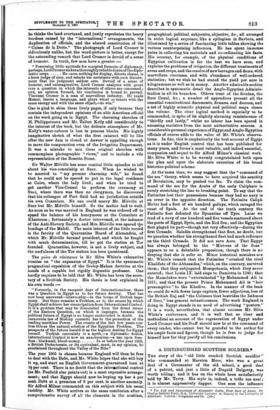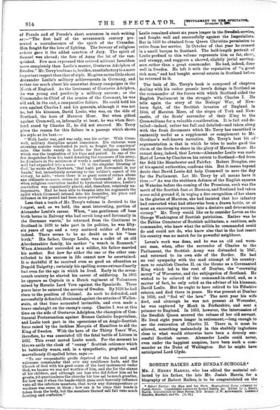A DISTINGUISHED SCOTTISH SOLDIER.*
THE story of the "old little crooked Scottish souldier" who commanded at Marston Moor, who was a great deal of a Covenanter of the old school, a good deal of a patriot, and just a little of Dugald Dalgetty, was worth telling ; and it has on the whole been satisfactorily told by Mr. Terry. His style is, indeed, a trifle too neat ; it is almost aggressively dapper. One sees the influence • The Life and Campaigns of Alexander Leslie. First Earl of Leven. By Charles Sanford Terry, MA.. Unlver5Ity Lecturer In Hlstory In the UnIrersity ut Aberdeen. London : Loupe/Ina and Co. [16,..]
of Fronde and of Froude's short sentences in such writing as ;—" The first half of the seventeenth century pre- sented a recrudescence of the spirit of the Crusades. Men fought for the love of fighting. The fervour of religious ardour gave it the added sanction of duty. The spirit of Samuel was abroad ; the fate of Agag the lot of the van- quished. Few men expressed this revived militant Israeldom more completely than Leslie's master, Gustavus Adolphus of Sweden." Mr. Terry's volume is, besides, unsatisfactory in a more important respect than that of style. He gives us too little about Alexander Leslie's military achievements in Germany, and rather too much about his somewhat dreary campaigns in the North of England. As the lieutenant of Gustavus Adolphus, he was young and positively a military success ; as the Commander-in-Chief of the armies of the Covenant, he was old and, in the end, a comparative failure. He could hold his own against Charles I. and his generals, although it was not he, but his kinsman, David Leslie, who was, on the side of Scotland, the hero of Marston Moor. But when pitted against Cromwell, as, informally at least, he was when Scot- land stood by Charles II., he did not succeed. Mr. Terry gives the reason for this failure in a passage which shows his style at its best:—
" With Leslie war, and war only, was his en/tier. With Crom- well, military discipline meant conscience. His victories were crowning mercies vouchsafed to such as fought for conscience' sake. One looks vainly in Leslie for that religious idealism which was the inspiration of his time and period. In one of the few despatches from his hand detailing the soccesses of his army, he dismisses in the minimum of words a sentiment which Crom-
well had expanded into a score It is the singular blessing of God,' he wrote after Newborn, 'that hath put Newcastell in our hands,' but, immediately reverting to the soldier's aspect of his victory, he adds, 'where there is so great score of cornea aboue ane ordinarie mr asure, armes for manic thousands.' At a time when religious conviction tended to hysterical utterance, Leslie's conviction was consistently placid, and, therefore, relatively un- impressive. Had he been able to breathe into his regiments the spirit which Cromwell infused into his Ironsides, his place and influence in his period had been more pervading."
Leas than a tenth of Mr. Terry's volume is devoted to the longest, and, as we hold, the most interesting, portion of Alexander Leslie's career. When, " ane gentleman off bass birth borne in Balveny who had servit long and fortunatly in the Germane warns," he returned from the Continent to Scotland in 1638 to take part in its politics, he was fifty- six years of age and a very matured soldier of fortune indeed. There seems to be no doubt as to his "bass birth." His father, George Leslie, was a cadet of an old Aberdeenshire family, his mother "a wench in Rannoch." When Alexander succeeded as a soldier, his father married his mother. But how far either the one or the other con- tributed to his success in life cannot now be ascertained.
It is doubtful if he received even so good an education as Dugald Dalgetty ; certainly his spelling seems extraordinarily bad even for the age in which he lived. Early in the seven- teenth century he started his career of soldiering. In 1605 he appears as Captain in a Dutch regiment of Volunteers raised by Horatio Lord Vere against the Spaniards. Three years later he entered the service of Sweden. By 1628 he had risen to the position of Colonel. As such he defended, and successfully defended, Stralsund against the attacks of Wallen- stein, at that time accounted invincible, and even made a
brave onslaught on the enemy's camp. Charles I. was at this time on the aide of Gustavus Adolphus, the champion of Con- tinental Protestantism against Roman Catholic Imperialism, ind Leslie took part in the operations of an Anglo-Scottish force raised by the luckless Marquis of Hamilton to aid the King of Sweden. With the hero of the Thirty Years' War, therefore, he was associated till the fatal battle of Lateen in 1632. This event moved Leslie much. For the moment he throws aside the cloak of 1. canny Scottish reticence which he habitually wears, and, in a sympathetic, prophetic, and
marvellously ill-spelled letter, says :—
"To our wnspeakable greife deprived of the best and most valorouse commander that evir any souldiours hade, and the Church of God with his good cause of the best instrument vnder God, we becaus we was not worthie of him, and she for the sinnes of hir children, and although our lose who did follow him sal be greats, yit questionlesse the churche hir lose sal be much greatter, for how can it when the heade which ea,aue such heavenly influence vnto all the inferiors members, that nevir any distemperature or weaknes was seene in them ; how can it be since that heade is taken from the body, hot the members thereof sail fall vnto much fainting and confusion."
Leslie remained about six years longer in the Swedish service, and fought well and successfully against the Imperialists. But in 1638 he obtained from Queen Christina permission to retire from her service. In October of that year he crossed in a small barque to Scotland. The half-length portrait of Leslie prefixed to this volume represents him as fat, short, and stumpy, and suggests a shrewd, slightly jovial serving. man rather than a great commander. He bad, indeed, done well in Sweden. He left it with the reputation of "a great rich man," and had bought several estates in Scotland before he returned to it.
The bulk of Mr. Terry's book is composed of chapters dealing with his rather prosaic hero's doings in Scotland as the commander of the forces with which Scotland aided the English Parliament in the struggle with Charles I. He tells again the story of the Bishops' War, of New- burn fight, of the Scottish invasion of England in 1644, of Marston Moor, of the sieges of York and New- castle, of the Scots' surrender of their King to the Cromwellians for a valuable consideration. It is full and de- tailed—indeed, rather too full and detailed—and taken along with the fresh documents which Mr. Terry has unearthed is eminently useful as a supplement or complement to Mr. Gardiuer's well-known narrative. Mr. Terry's best bit of argumentation is that in which he tries to make good the claim of the Scots to share in the glory of Marston Moor. He cannot deny, indeed, that Leven—Alexander Leslie was made Earl of Leven by Charles on his return to Scotland—fled from the field like Manchester and Fairfax. Robert Douglas, one of his special authorities, confirms this. But it seems beyond doubt that David Leslie did help Cromwell to save the day for the Parliament. Let Mr. Terry by all means have it thus r—" As was the stubborn defence of the English squares at Waterloo before the coming of the Prussians, such was the merit of the Scottish foot at Marston, and Scotland had taken some solid ground if, in urging a due recognition of her share in the glories of Marston, she bad insisted that her infantry had converted what had otherwise been a drawn battle, or at most an encouraging success, into a decisive and determining victory." Mr. Terry would like us to consider Leven as the George Washington of Scottish patriotism. Rather was he the Fabius Cunctator of Scottish militarism, a cautious, safe commander, who knew what the militia he commanded could do and could not do, who knew also that in the last resort his country was no match for its powerful neighbour.
Leven's work was done, and he was an old and worn. out man, when, after the surrender of Charles to the Parliament, the Scottish Army was disbanded in 1647, and returned to its own side of the Border. He had no real sympathy with the mad attempt of his country- men to establish Charles II. on the throne as a Covenanted King which led to the rout of Dunbar, the "crowning mercy" of Worcester, and the subjugation of Scotland. He wished to be relieved of the command-in-chief, and, as a matter of fact, he only acted as the adviser of his kinsman, David Leslie. But he ought to have retired to his Fifeshire estates, and died there in peace. He was present at Dunbar in 1650, and "fled wi' the lava" The next year his wife died, and although he was not present at Worcester, he was captured by Monk in Forfarshire, and sent a prisoner to England. In 1653, however, the intercession of the Swedish Queen secured the release of her old servant. He lived eight years longer in retirement,—long enough to see the restoration of Charles II. There is, it must be allowed, something melancholy in this shabbily inglorious close to what would otherwise have been a doucely suc- cessful Scottish career. Alexander Leslie could never, even under the happiest auspices, have been such a com- mander as the Duke of Wellington. But he might have anticipated Lord Clyde.























































 Previous page
Previous page